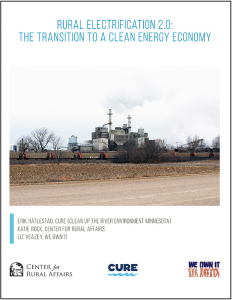Rural electric cooperatives’ loyalty to coal is holding rural America back.
That’s according to a new report authored by CURE, We Own It, and the Center for Rural Affairs.
During the 1970s, the country’s electric co-ops made significant investments to build coal-burning power plants; this was done in the interest of providing low-cost electricity to their member-owners. Co-ops took on massive amounts of debt, mostly from the Federal Government. One year a loan to Basin Electric for a coal plant took up almost the entire annual budget for loans from the Rural Utility Service (RUS), a department of the U.S. Department of Agriculture (USDA).

In 2019, the world of energy is very different.
Coal is now increasingly expensive as well as being a leading contributor to climate change. With this rise in the cost of coal and the simultaneous drop in the price of renewables, coal is an increasingly bad choice for utilities. Today most coal plants are considered to be uneconomic assets by utilities, and co-ops are identifying coal plants as stranded assets.
Rural Electric Co-ops are caught between the push for clean energy and their stranded assets leading many co-ops to double down on their bad investments and push a pro-coal agenda that approaches a dogmatic rejection of the potential prosperity of clean energy for rural communities. As co-ops reject the new reality of more affordable electricity generation and a more distributed, safe, and modern utility system, rural America is being left behind by clean energy prosperity while also having more expensive electricity and an unstable utility structure.
We need strong, forward-looking Rural Electric Co-ops that are ready to serve our rural communities for the next 100 years. We need our co-ops to deliver on their founding promise of member control and democratizing the rural economy. Relieving the burden of electric co-op coal debt is one way to make that happen.
